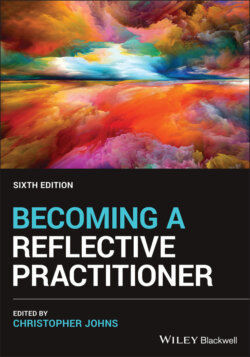Читать книгу Becoming a Reflective Practitioner - Группа авторов - Страница 17
Reflection
ОглавлениеA good place to start is a quote from Wheatley and Kellner‐Rogers (1996, p. 69): ‘Life is playful and life plays with us. The future cannot be determined. It can only be experienced as it is occurring. Life doesn’t know what it will be until it notices what it has just become’. I like these words because they are playful. Reflection is playful and is the gateway to knowing life as it is occurring and knowing life as it has just become.
Reflection is a process of self‐inquiry towards self‐realisation, however, that might be expressed. It enables practitioners to learn reflexively through their everyday experiences. Experience is a rich learning opportunity when we pay critical attention to it. As O’Donohue (1997, p. 26) writes:
‘Everything that happens to you has the potential to deepen you’. This potential is actuated through reflection as a self‐inquiry into experience to find meaning, gain insight and prompt action that will deepen you.
Learning is expressed as insights. Insights are focused towards realising the practitioner’s vision of the desirable practice. Reflection moves the practitioner away from an uncritical, pre‐reflective state of being where aspects of the practice were not questioned but simply taken for granted (Cox et al. 1991).
The words reflection and reflective practice are often used glibly in everyday discourse as if reflection is simply a normal way of thinking about something that has happened and which requires little skill or guidance. Smyth (1992, p. 285) writes:
Reflection can mean all things to all people … it is used as a kind of umbrella or canopy term to signify something that is good or desirable … everybody has his or her own (usually undisclosed) interpretation of what reflection means, and this interpretation is used as the basis for trumpeting the virtues of reflection in a way that makes it sound as virtuous as motherhood.
Smyth’s words are both salutary and provocative. They remind us to be careful about grasping reflection in any casual or authoritative way. The Compact Oxford English Dictionary 3e defines ‘reflect’ as:
throw back heat, light, sound without absorbing it,
(of a mirror or shiny surface) show an image of,
represent in a realistic or appropriate way,
bring about a good or bad impression of someone or something (on),
think deeply or carefully about.
Hence reflection can be viewed as a mirror to see images or impressions of self thrown back in the context of the particular situation. It is thinking deeply about the way the practitioner responded and reasons for that response in light of what they were trying to achieve. It is self‐judgmental – did I do good or bad? It is a wake up call because so much of practice is non‐reflective, merely a matter of habit and automatic response.
Next time you are at work, ask yourself some questions.
‘Why am I responding as I am?’
‘Am I being effective?’
‘Could I respond in different, perhaps more effective ways?’
‘Am I responding in tune with my vision of practice?’
Sensible questions the responsible practitioner should naturally ponder as they go about their practice and to reflect on later. These questions open the doorway to self‐inquiry. As a consequence, the practitioner becomes more sensitive to their practice. They step along the reflective road.
